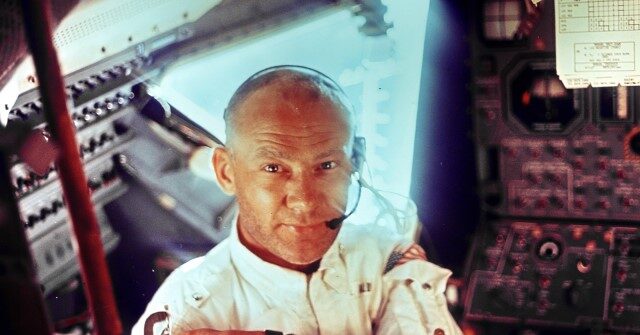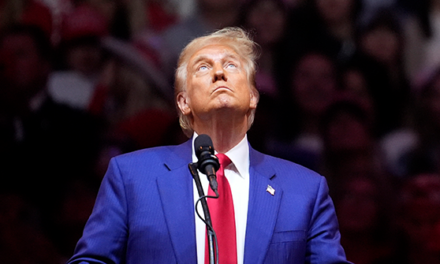We support our Publishers and Content Creators. You can view this story on their website by CLICKING HERE.

Famed astronaut Buzz Aldrin endorsed former President Donald Trump, highlighting how under the his first administration the United States “saw a revitalized interest in space.”
In a press release on Wednesday, Aldrin highlighted the accomplishments the Trump administration made to elevate “human space exploration” and how the Trump administration “reinstituted the National Space Council,” and created the U.S. Space Force.
Aldrin added that as the nation faces “serious and difficult realities on the global security landscape,” the nation was also experiencing “economic challenges, stability in our communities, and rule of law concerns,” adding that he feels that the United States is “best served by voting for” Trump.
“Most citizens rightly consider it an honor to cast their vote for a leader they believe will best serve the Nation — our government by, for and of the people. For me, for the future of our Nation, to meet enormous challenges, and for the proven policy accomplishments above,” Aldrin said, “I believe the nation is best served by voting for Donald J. Trump. I wholeheartedly endorse him for President of the United States. Godspeed President Trump, and God Bless the United States of America.”
Aldrin explained in his press release:
A half-Century ago, I was part of an important effort to put a human being on the Moon. It was an honor to serve my country in that capacity. I am proud of what we accomplished then. While it has been 55 years since Americans set foot on the Moon, the only nation ever to do so, that effort continues to inspire new generations of Americans – to press ahead, blaze new trails of understanding, and expand our presence in space, For All Mankind. I have dedicated my life to the pursuit of scientific understanding, exploration, and an enduring human presence in space. The importance of that mission, that calling, runs through every fiber of my being.
Aldrin added that he had watched the “government’s approach to space wax and wane” throughout the years, noting that the Trump administration “elevated” human space exploration, and “reignited national efforts to get back to the Moon, and push on to Mars.”
Over the years, I have seen our government’s approach to space wax and wane, a fluctuating dynamic that has disappointed me from time to time. But under the first Trump administration, I was impressed to see how human space exploration was elevated, made a policy of high importance again. Under President Trump’s first term, America saw a revitalized interest in space. His Administration reignited national efforts to get back to the Moon, and push on to Mars — programs that continue today.
The Trump Administration also reinstituted the National Space Council, so leading voices could advocate for the importance of space to America. Finally, under President Trump, the Nation’s defense was enhanced with the creation of the U.S. Space Force-increasingly important as space becomes a contested domain. At the same time, I have been enthused and excited by the great advancements in the private sector space economy, led by visionaries like Elon Musk. These are concrete accomplishments that align with my concerns and America’s policy priorities.
Being the President of the United States “requires an understanding of human nature, clarity in judgement, decisiveness, knowledge, understanding, and calm under pressures,” that very few people “have a natural ability to manage,” Aldrin added in the press release.
“It is a job where decisions are made that routinely involve American lives — some urgently but not without thought,” Aldrin continued. “The job requires sober analysis of frightening scenarios, and the instinct to lead with resolve.”
Aldrin graduated from the United States Military Academy at West Point, served as a pilot in the U.S. Air Force, and fought in the Korean War. He rose to fame after he piloted NASA’s Apollo 11 mission, and became the second man to walk on the moon, just minutes after the mission’s commander, Neil Armstrong.

 Conservative
Conservative  Search
Search Trending
Trending Current News
Current News 







